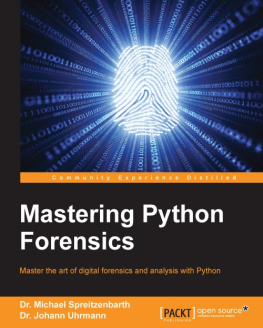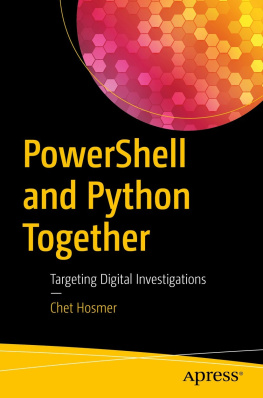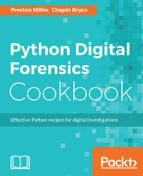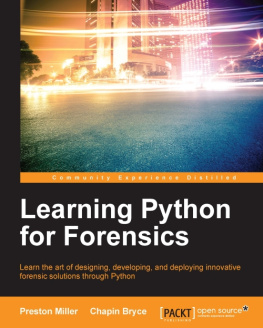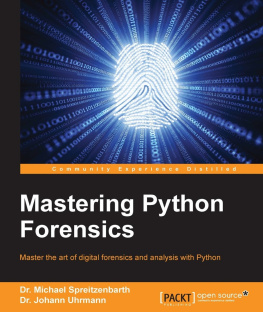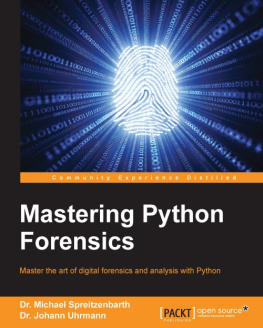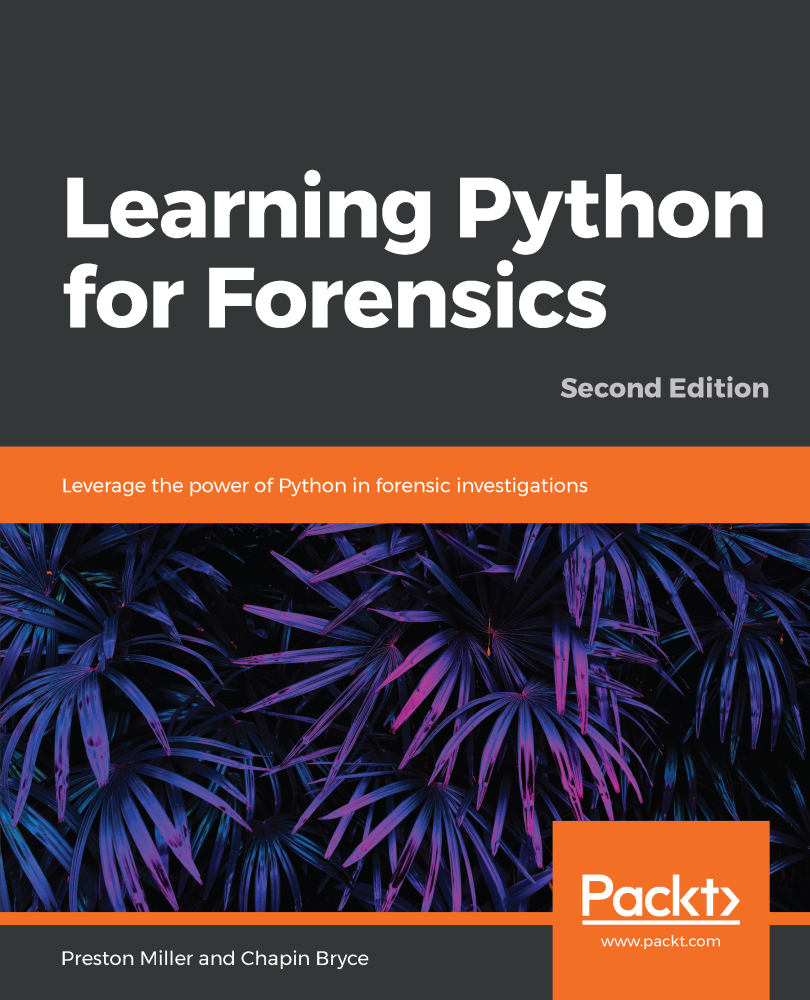
Learning Python for Forensics
Second Edition
Leverage the power of Python in forensic investigations
Preston Miller
Chapin Bryce

BIRMINGHAM - MUMBAI
Learning Python for ForensicsSecond Edition
Copyright 2019 Packt Publishing
All rights reserved. No part of this book may be reproduced, stored in a retrieval system, or transmitted in any form or by any means, without the prior written permission of the publisher, except in the case of brief quotations embedded in critical articles or reviews.
Every effort has been made in the preparation of this book to ensure the accuracy of the information presented. However, the information contained in this book is sold without warranty, either express or implied. Neither the authors, nor Packt Publishing or its dealers and distributors, will be held liable for any damages caused or alleged to have been caused directly or indirectly by this book.
Packt Publishing has endeavored to provide trademark information about all of the companies and products mentioned in this book by the appropriate use of capitals. However, Packt Publishing cannot guarantee the accuracy of this information.
Commissioning Editor: Gebin George
Acquisition Editor: Joshua Nadar
Content Development Editor: Chris D'cruz
Technical Editor: Dinesh Pawar
Copy Editor: Safis Editing
Project Coordinator: Namrata Swetta
Proofreader: Safis Editing
Indexer: Rekha Nair
Graphics: Tom Scaria
Production Coordinator: Nilesh Mohite
First published: May 2016
Second edition: January 2019
Production reference: 1310119
Published by Packt Publishing Ltd.
Livery Place
35 Livery Street
Birmingham
B3 2PB, UK.
ISBN 978-1-78934-169-0
www.packtpub.com
mapt.io
Mapt is an online digital library that gives you full access to over 5,000 books and videos, as well as industry leading tools to help you plan your personal development and advance your career. For more information, please visit our website.
Why subscribe?
Spend less time learning and more time coding with practical eBooks and Videos from over 4,000 industry professionals
Improve your learning with Skill Plans built especially for you
Get a free eBook or video every month
Mapt is fully searchable
Copy and paste, print, and bookmark content
Packt.com
Did you know that Packt offers eBook versions of every book published, with PDF and ePub files available? You can upgrade to the eBook version at www.packt.com and as a print book customer, you are entitled to a discount on the eBook copy. Get in touch with us at customercare@packtpub.com for more details.
At www.packt.com , you can also read a collection of free technical articles, sign up for a range of free newsletters, and receive exclusive discounts and offers on Packt books and eBooks.
Contributors
About the authors
Preston Miller is a consultant at an internationally recognized risk management firm. Preston holds an undergraduate degree from Vassar College and a master's degree in digital forensics from Marshall University. While at Marshall, Preston unanimously received the prestigious J. Edgar Hoover Foundation's scientific scholarship. Preston is a published author, recently of Python Digital Forensics Cookbook, which won the Forensic 4:cast Digital Forensics Book of the Year award in 2018. Preston is a member of the GIAC advisory board and holds multiple industry-recognized certifications in his field.
To my grandfather, who taught me the value of hard work, dedication, and the pursuit of excellence, without whose love and support I would not be the person I am today.
Chapin Bryce is a consultant at a global firm that is a leader in digital forensics and incident response investigations. After graduating from Champlain College with a bachelor's degree in computer and digital forensics, Chapin dove into the field of digital forensics and incident response joining the GIAC advisory board and earning four GIAC certifications: GCIH, GCFE, GCFA, and GNFA. As a member of multiple ongoing research and development projects, he has authored several books and articles in professional and academic publications, including Python Digital Forensics Cookbook (Forensic 4:Cast Digital Forensics Book of the Year, 2018), Learning Python for Forensics, First Edition, and Digital Forensic Magazine.
To Alexa, who I hope will learn Python in the near future.
About the reviewer
Marek Chmel is an IT consultant and trainer with more than 10 years' experience. He is a frequent speaker, focusing on Microsoft SQL Server, Azure, and security topics. Marek writes for Microsoft's TechnetCZSK blog and has been an MVP: Data Platform since 2012. He has earned numerous certifications, including MCSE: Data Management and Analytics, EC Council Certified Ethical Hacker, and several eLearnSecurity certifications.
Marek earned his MSc (business and informatics) degree from Nottingham Trent University. He started his career as a trainer for Microsoft server courses. Later, he joined AT&T as a principal database administrator specializing in MSSQL Server, data platforms, and machine learning.
Packt is searching for authors like you
If you're interested in becoming an author for Packt, please visit authors.packtpub.com and apply today. We have worked with thousands of developers and tech professionals, just like you, to help them share their insight with the global tech community. You can make a general application, apply for a specific hot topic that we are recruiting an author for, or submit your own idea.
Preface
At the outset of writing Learning Python for Forensics , we had one goal: to teach the use of Python for forensics in such a way that readers with little to no programming experience could follow along immediately and develop practical code for use in casework. That's not to say that this book is intended for the Python neophyte; throughout, we ease the reader into progressively more challenging code and end by incorporating many of the scripts in previous chapters into a forensic framework. This book makes a few assumptions about the reader's programming experience, and where it does, there will often be a detailed explanation with examples and a list of resources to help bridge the gap in knowledge.
The majority of the book will focus on developing code for various forensic artifacts; however, the first two chapters will teach the basics of the language. This will level the playing field for readers of all skill levels. We intend for the complete Python novice to be able to develop forensically sound and relevant scripts by the end of this book.
Much like in the real world, code development will follow a modular design. Initially, a script might be written one way before rewritten in another to show off the advantages (or disadvantages) of various techniques. Immersing you in this fashion will help build and strengthen the neural links required to retain the process of script design. To allow Python development to become second nature, please retype the exercises shown throughout the chapters for yourself to practice and learn common Python tropes. Never be afraid to modify the code, you will not break anything (except maybe your version of the script) and will have a better understanding of the inner workings of the code as a result.
Next page

